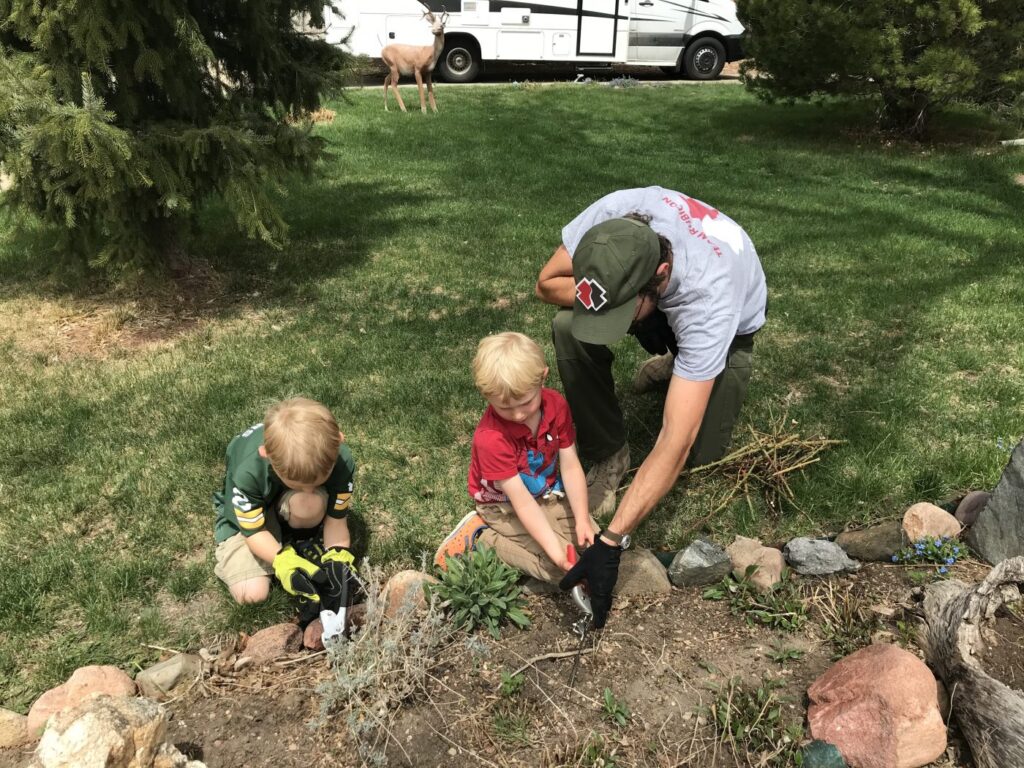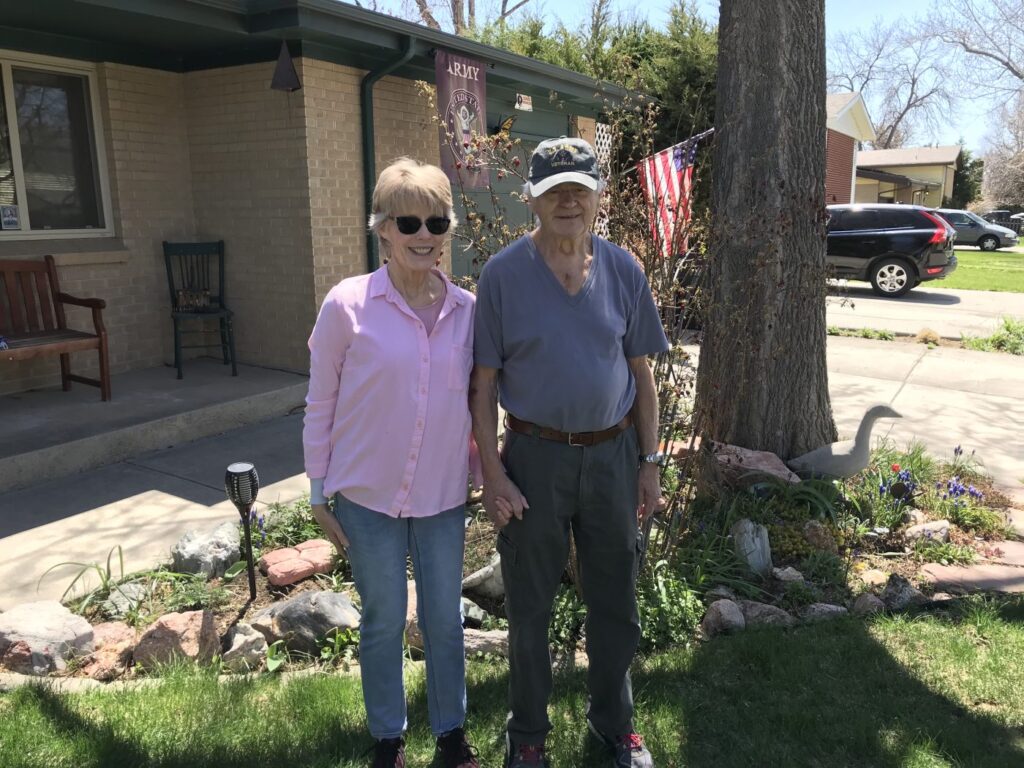A few years ago, when John Frost moved to Arvada, Colorado, with his wife and two young sons, he remembers being welcomed by their new neighbor on their first full day in the home. Alfred Feulner, a U.S. veteran in his eighties, stopped by to introduce himself—and also to ask if the family wanted to borrow any necessary household items, specifically his lawnmower. He thought that their front lawn looked “a bit unkempt,” having become overgrown while nobody was living there.
Frost remembers chuckling at this warm interaction with his neighbor, who reminded him of his grandfather, as both had similarly immigrated to the United States during the early-20th century from Bavaria, a German state near the border with Austria. Since that initial introduction, the neighboring households made a habit of checking in on each other from time to time. So, when Frost learned that Feulner—who served in the U.S. Army from 1960 through 1964, and the Army Reserves until 1966—was beginning the first week of recovery from a quadruple bypass heart surgery just as COVID-19 was spreading in the United States, he wanted to do whatever he could to help. Especially, Frost says, to relieve some stress for the U.S. veteran’s wife, who is looking after her recovering husband in their home.

Frost with his Greyshirts-in-training.
“The whole neighborhood was worried about him,” Frost says. “Especially during this time.” While nobody is immune from the threat of coronavirus, individuals over the age of 65 are at the highest risk of developing a severe illness or complications stemming from the virus. Offering a helping hand to even the most self-sufficient seniors so that they can comply with stay-at-home orders can be a lifesaving gesture when it comes to protecting their health amid the pandemic.
For the Very Young, a Lesson in Service
After learning about the surgery, Frost—who himself is not a veteran but became a Greyshirt a few years ago after learning that anybody could be involved with Team Rubicon—reached out to ask how he could be of assistance. Appropriately, Frost says, his neighbor “was most concerned about getting his [own] lawn in shape.” So, the Arvada resident decided to throw on his grey shirt and slap sunscreen on his two young sons Fitch, 4, and Otter, 5. Then the three of them got to work.
“We cleaned out their three front yard garden beds, trimmed the hedges, and flagged their sprinkler heads for the aeration service,” Frost says. “The boys were happy to be outside and active, and it was nice to be able to do something to help out while maintaining the social distancing which is so vital right now.”

Alfred and Jacque Feulner near their garden.
Their efforts weren’t just a great way to help out their neighbors, Frost says, but also “a nice way to have the boys burn off energy,” as the family honors stay-at-home guidance during the coronavirus pandemic. It was also an ideal opportunity to teach his two young sons about the importance of volunteering, the Greyshirt says. “You get to do something for Team Rubicon, you get to do something for a neighbor in need, and you get to show your kids that you can help—and you should help.”
Neighbors Help Neighbors Go Green Across the U.S.
Frost is just one of numerous Greyshirts across the country who has offered to assist a neighbor with yard work. Take Bryant “Minion” Minton, who’s based in Rome, Georgia.
“In the middle of March as the COVID pandemic started unfolding on a national level, my wife and I would walk the neighborhood and check on people who lived around us,” says Minton, who first became involved with Team Rubicon back in February 2014. “I was sitting on my back deck with my wife [when] I heard my neighbor’s son cutting his dad’s grass. I decided to grab my weed eater and help him trim around the walkways and flower beds. It seemed like the right thing to do.”
“My neighbor was very appreciative of the gesture and thanked me for my kindness. I didn’t think it was too much [of an effort],” Minton says. “I didn’t serve in the Armed Forces due to circumstances beyond my control, but my family has served in the United States Air Force for three generations. Needless to say, service toward others is deeply ingrained in my family DNA. I think if everyone gave a little of themselves to help their neighbors every now and then, the world would be a lot better.”
Another Greyshirt (who wishes to remain unnamed) has been anonymously mowing a 3-acre-plus lawn owned by his southern Illinois neighbor since the state’s social distancing orders were put in place last month. “I served in the Army right out of high school [then] in the Army National Guard for eight years,” says the Greyshirt, who joined Team Rubicon in October last year.
“The volunteer work that I do brings me back to my days of serving my country. Serving others is a part of a soldier’s creed; it’s instilled in my blood now,” he says. “The COVID-19 pandemic has been new for everyone. My only suggestion is that if you are healthy, check on people in your community—especially the elderly and the nurses who are on the front lines fighting a battle that we do not have a playbook for.”
Greyshirt Marine Turns Her Simple Delivery into service
In Phoenix, Arizona, Cathie Zimmerman—a former member of the U.S. Marine Corps and a current Greyshirt—was helping demolish the drywall ceiling of a local community building when the property owner asked a favor: Would Zimmerman, who drives a large truck, be willing to deliver a lawnmower to her 65-year-old sister, who is a Type 1 diabetic and usually has no one to help her at home? After she obliged, Zimmerman picked up the lawnmower, sterilized it, gave it a tune-up, and then drove to the woman’s address.

Zimmerman to prepares to take on yard work. Photo by Greyshirt Lauren Mitchell.
“When I got there, I delivered the lawnmower and asked if she minded if I mowed her yard for her,” Zimmerman says. “She tearfully accepted and said how much she loved me. She said it’s been hard for her to keep up with everything that’s happening and was just trying to do the best she could.” Zimmerman trimmed the remaining trees in the yard, hauled away prior trimmings, and mowed and edged the Phoenix community member’s lawn.
“So many people in my neighborhood aren’t working right now [and therefore] have to forgo landscaping crews,” Zimmerman says. “They’re trying to keep up with all kinds of things,” she continues, whether it be navigating unemployment, homeschooling children, or protecting their own compromised health. “If I can do these tasks, I am happy and excited to.”



